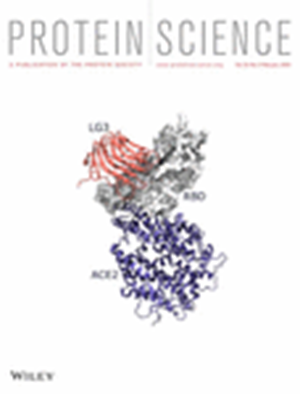疏水性、侧链和盐如何影响无序蛋白质的尺寸
IF 4.5
3区 生物学
Q1 BIOCHEMISTRY & MOLECULAR BIOLOGY
引用次数: 0
摘要
尽管人们普遍认为疏水效应是折叠的驱动力,但许多固有无序蛋白(IDPs),包括那些具有典型可折叠蛋白疏水成分的蛋白,在生理条件下几乎表现为自避让随机游走(SARWs)。在这里,我们测试了温度和离子条件如何影响pertactin(PNt)N-末端结构域的尺寸,PNt是一种具有典型折叠蛋白氨基酸组成的IDP。虽然PNt会随着温度的升高而收缩,但在10-58°C的温度范围内它仍然保持膨胀,其Flory指数ν为0.50。低离子强度和高离子强度也会导致 PNt 收缩,但这种收缩会通过减少电荷分离而得到缓解。雪跳蚤抗冻蛋白(red-sfAFP)具有 46% 的甘氨酸和较低的疏水性,其还原形式不受温度和离子强度的影响,并以接近 SARW 的形式存在(ν ~ 0.54),这表明 PNt 的热收缩是由于疏水侧链之间更强的相互作用造成的。此外,红色-sfAFP 是多肽骨架的代表,而多肽骨架被认为会在水中塌缩。增加红-sfAFP 中的甘氨酸分离对 ν 的影响微乎其微。即使有 21 个连续的甘氨酸残基(ν > 0.5),水仍然是良好的溶剂,而且根据氢交换,红色-sfAFP 变体缺乏稳定的骨架氢键。同样,在其他富含甘氨酸的蛋白质中,改变甘氨酸分离对 ν 的影响也很小。这些发现强调了一个普遍性,即许多无序状态可以是扩展的和非结构化的,而对于典型的蛋白质序列来说,仅疏水效应不足以驱动链的显著崩溃。本文章由计算机程序翻译,如有差异,请以英文原文为准。
How hydrophobicity, side chains, and salt affect the dimensions of disordered proteins
Despite the generally accepted role of the hydrophobic effect as the driving force for folding, many intrinsically disordered proteins (IDPs), including those with hydrophobic content typical of foldable proteins, behave nearly as self‐avoiding random walks (SARWs) under physiological conditions. Here, we tested how temperature and ionic conditions influence the dimensions of the N‐terminal domain of pertactin (PNt), an IDP with an amino acid composition typical of folded proteins. While PNt contracts somewhat with temperature, it nevertheless remains expanded over 10–58°C, with a Flory exponent, ν , >0.50. Both low and high ionic strength also produce contraction in PNt, but this contraction is mitigated by reducing charge segregation. With 46% glycine and low hydrophobicity, the reduced form of snow flea anti‐freeze protein (red‐sfAFP) is unaffected by temperature and ionic strength and persists as a near‐SARW, ν ~ 0.54, arguing that the thermal contraction of PNt is due to stronger interactions between hydrophobic side chains. Additionally, red‐sfAFP is a proxy for the polypeptide backbone, which has been thought to collapse in water. Increasing the glycine segregation in red‐sfAFP had minimal effect on ν . Water remained a good solvent even with 21 consecutive glycine residues (ν > 0.5), and red‐sfAFP variants lacked stable backbone hydrogen bonds according to hydrogen exchange. Similarly, changing glycine segregation has little impact on ν in other glycine‐rich proteins. These findings underscore the generality that many disordered states can be expanded and unstructured, and that the hydrophobic effect alone is insufficient to drive significant chain collapse for typical protein sequences.
求助全文
通过发布文献求助,成功后即可免费获取论文全文。
去求助
来源期刊

Protein Science
生物-生化与分子生物学
CiteScore
12.40
自引率
1.20%
发文量
246
审稿时长
1 months
期刊介绍:
Protein Science, the flagship journal of The Protein Society, is a publication that focuses on advancing fundamental knowledge in the field of protein molecules. The journal welcomes original reports and review articles that contribute to our understanding of protein function, structure, folding, design, and evolution.
Additionally, Protein Science encourages papers that explore the applications of protein science in various areas such as therapeutics, protein-based biomaterials, bionanotechnology, synthetic biology, and bioelectronics.
The journal accepts manuscript submissions in any suitable format for review, with the requirement of converting the manuscript to journal-style format only upon acceptance for publication.
Protein Science is indexed and abstracted in numerous databases, including the Agricultural & Environmental Science Database (ProQuest), Biological Science Database (ProQuest), CAS: Chemical Abstracts Service (ACS), Embase (Elsevier), Health & Medical Collection (ProQuest), Health Research Premium Collection (ProQuest), Materials Science & Engineering Database (ProQuest), MEDLINE/PubMed (NLM), Natural Science Collection (ProQuest), and SciTech Premium Collection (ProQuest).
 求助内容:
求助内容: 应助结果提醒方式:
应助结果提醒方式:


